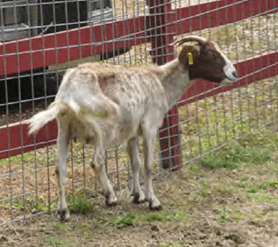The post ‘Behind the Screens’: The Killing of Juvenile Horses appeared first on PETA.
NIH Has Been Fueling a Ring of Killers With Your Cash—You Can Help Stop It
The One New Way to Stop NIH From Wasting Your Money on Global Shams
What’s the CARGO Act, and Why Do Animals Need You to Support It Now?
NIH Has Been Gobbling Up Your Money for Foreign Labs, but One Thing Could Stop That
NIH Has Been Misusing Your Money for Years, but This Could Change Everything
The One Thing That Could Curb a Worldwide Laboratory Killing Spree
Your Tax Dollars Have Funded Animal Killings Worldwide—This Act Could Change That
NIH Has Been Fueling a Ring of Killers With Your Cash—This Could Stop It
Foreign Killers’ Gravy Train May Soon Be Derailed—and You Can Help
What Could Quash NIH’s Overseas Lab Torture? You Can Help—With One Simple Action
The National Institutes of Health has been in the worldwide animal killing business for at least 40 years, pumping billions into foreign laboratories. The CARGO Act could end it.
The National Institutes of Health has been pumping billions of your tax dollars into foreign laboratories without oversight or accountability. Please support the CARGO Act to end this boondoggle.
The National Institutes of Health has spent 40 years bankrolling foreign laboratories to torment and kill animals around the world. Please support the CARGO Act to end it.
For years, NIH has been letting you foot the bill for people who are in the business of killing in foreign lands. The CARGO Act can end this reign of terror.
For decades, NIH has been paying foreign laboratories to torment and kill animals. The CARGO Act can help end this reign of terror.
The post NIH Has Been Fueling a Ring of Killers With Your Cash—You Can Help Stop It appeared first on PETA.
Your H&M Sweater Is A Horror Story (Cashmere)
The post Your H&M Sweater Is A Horror Story (Cashmere) appeared first on PETA.
New PETA Virtual Reality Experience Promises Close Encounters at University of Denver
To encourage empathy for animals suffering in university laboratories, PETA is visiting the University of Denver today with Abduction, a unique virtual reality experience landing on college campuses across the country. In this eerie experience, visitors will enter a mysterious truck containing a mobile virtual reality studio. The students will seemingly find themselves stranded in the desert with a couple of fellow humans, abducted by aliens, taken aboard a spaceship, and subjected to a shocking experience, similar to what animals endure in laboratories. They’ll watch as their friends are subjected to painful tests—knowing that they’ll be next.
When: Today, Tuesday, October 24, 11 a.m.–4 p.m.
Where: Campus Green, near Community Commons, University of Denver
Watch the trailer here. Broadcast-quality footage of the Abduction virtual reality experience is available upon request.
Experimenters at the University of Denver subjected mice to numerous repeated traumatic brain injuries—shaving their heads, immobilizing them, and striking them on the head five times every 48 hours for up to 10 consecutive days—likely causing loss of consciousness, memory impairment, nausea, dizziness, and other debilitating symptoms. At the end of the experiment, the mice were killed and dissected. Experimenters also bred mice to show symptoms of Down syndrome and amyotrophic lateral sclerosis (ALS), implanted pumps under their skin, and injected them with chemicals. Some mice became so debilitated that they couldn’t stand up. At that point, they were decapitated.
“Many students don’t know that on their own college campuses, frightened and confused animals are being psychologically tormented, mutilated, and killed in laboratories, with no way to escape or even understand what’s happening to them,” says Senior Director of peta2 Rachelle Owen. “PETA is on a mission to open young people’s eyes to this cruelty, help students understand what it feels like, and motivate them to join our call for a switch to superior, non-animal research.”
Studies show that 90% of all basic research—most of which involves animals—fails to lead to treatments for humans, which is why PETA is pushing universities to pivot to sophisticated, human-relevant research methods.
Abduction—which was filmed in VR180 with assistance from the immersive content creation studio Prosper XR—has stopped at nearly three dozen other college campuses over the last year, including Harvard University, the Massachusetts Institute of Technology, the University of California–Los Angeles, and the University of Texas at Austin.
PETA—whose motto reads, in part, that “animals are not ours to experiment on”—opposes speciesism, a human-supremacist worldview. For more information on PETA’s investigative newsgathering and reporting, please visit PETA.org, listen to The PETA Podcast, or follow the group on X (formerly Twitter), Facebook, or Instagram.
The post New PETA Virtual Reality Experience Promises Close Encounters at University of Denver appeared first on PETA.
USDA Licenses Birmingham Facility One Day After Documenting Severe Neglect
Please see the following statement from Katherine Groff, M.S., senior scientist at PETA, concerning just-released photos by the U.S. Department of Agriculture (USDA) showing severe neglect at Southern Biotechnology Associates, which provide more evidence of bleak conditions at an antibody-production facility and a lack of USDA oversight:
An emaciated goat at Southern Biotechnology Associates on May 24, 2023
A Birmingham, Alabama, antibody production facility received a license from the USDA just one day after the agency cited the company for violations of the federal Animal Welfare Act (AWA). Photos recently released to PETA by the USDA in response to a public records request show animals in urgent need of veterinary attention during the agency’s May 24, 2023, inspection. Among other violations, goats were suffering from lameness or unable or reluctant to even walk. One goat was trying to walk on front joints and another on only his front legs. Another lame goat was emaciated, and one had a 2-inch facial swelling. None of the animals had received veterinary care. The USDA stated that all violations must be addressed within two more inspections or the facility would forfeit its license, but it then conducted another investigation the following day and approved relicensing under the AWA—clearly, insufficient time to ensure that the animals had received adequate care.
Not only did the USDA fail in its job to protect severely neglected animals, there are also better methods for obtaining antibodies than by using animals—begging the question of why animals are even used for this purpose. Numerous companies produce animal-free antibodies, and PETA entities have funded the production and use of antibodies that are scientifically superior to and can replace the use of animal-derived antibodies. (See here and here.) It’s time that we stop using animals for their antibodies when there are more scientifically sound and humane options.
For more information on PETA’s investigative newsgathering and reporting, please visit PETA.org, listen to The PETA Podcast, or follow the group on X (formerly Twitter), Facebook, or Instagram.
The post USDA Licenses Birmingham Facility One Day After Documenting Severe Neglect appeared first on PETA.


